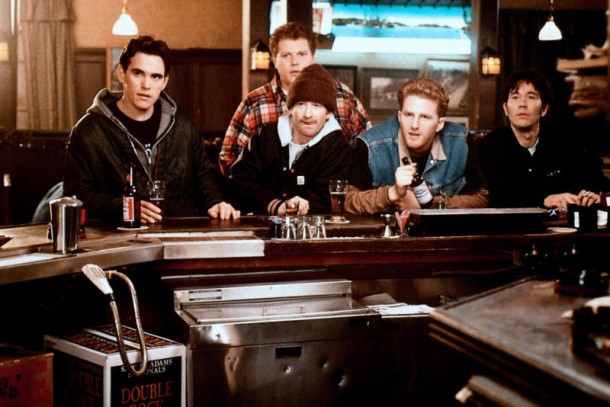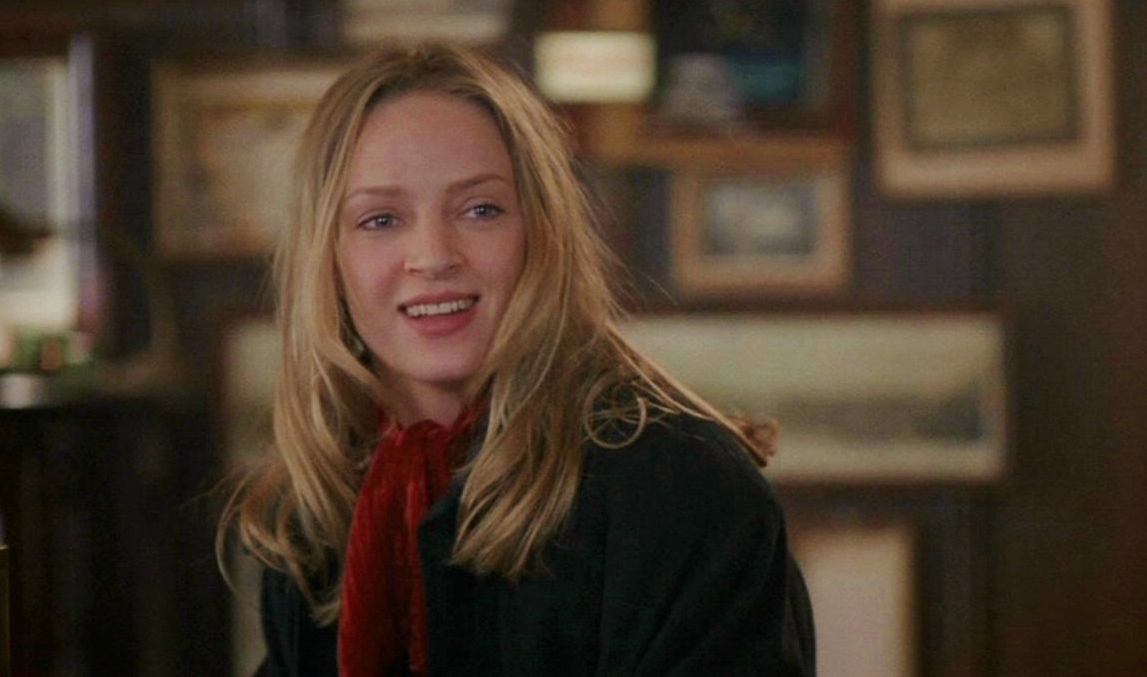By Robin Hitchcock
 |
| The male cast of Beautiful Girls |
It always raises a red flag for me when a film presents men one way and women another. My feminist knee starts to jerk—GENDER BINARY—BIOLOGICAL ESSENTIALISM—DANGER WILHELMINA ROBINSON!
So 1996’s Beautiful Girls, an ensemble belated-coming-of-age story centered around New York City pianist Willie (Timothy Hutton) returning to his hometown for a high school reunion, starts out on notice because it centers on big ideas about The Way Men Are. And that’s before it goes down an even more troubling Lolita-esque road. And yet, it’s one of my favorite movies. I’m just not sure if I should qualify it as a guilty pleasure.
The main thesis of Beautiful Girls is that men will never be satisfied with what they have because they can always imagine having something more. They’ll never be satisfied with the women the are with because there will always be other women they could be getting—prettier, younger, cooler, NEWER women. As the film’s voice-of-lunacy, Paul (Michael Rapaport) explains in the films title-bestowing monologue:
A beautiful girl can make you dizzy, like you’ve been drinking Jack and Coke all morning. She can make you feel high full of the single greatest commodity known to man – promise. Promise of a better day. Promise of a greater hope. Promise of a new tomorrow. This particular aura can be found in the gait of a beautiful girl. In her smile, in her soul, the way she makes every rotten little thing about life seem like it’s going to be okay.
But yearning for this promise leads these guys to neglect the women they can and do have relationships with. This is laid out without any subtlety in a quaint quasi-feminist rant oh-so-clearly written by a man in the 1990s but delivered with winning gusto by Rosie O’Donnell, who details the artifice of the women presented in a pornographic magazine and laments: “But you fucking mooks, if you think that if there’s a chance in hell that you’ll end up with one of these women, you don’t give us real women anything approaching a commitment.” The men don’t really consider that even if one of these perfect supermodels walked into their lives they might not be able to have her, which becomes abundantly clear later on.
 |
| Rosie O’Donnell as Gina in Beautiful Girls |
So much of the conflict in
Beautiful Girls reads as “Woe, the pain of basking in male privilege.” This can be very annoying. But the film clearly aims to critique this attitude and demonstrate that its men would be much happier if they would just settle down (emphasis on “settle”). So it’s possible that
Beautiful Girls actually seeks to deconstruct gender stereotypes and attack the system which creates both the perils of the privileged and desperation of those who are not.
 |
| Timothy Hutton and Natalie Portman in Beautiful Girls |
But before I go any further with giving Beautiful Girls the benefit of the doubt, I should mention that the core plot thread is the main character Willie falling in love with the girl next door. The girl next door who is thirteen-years-old. RECORD SCRATCH! This thirteen-year-old neighbor, Marty (Natalie Portman), is so charming and vibrant and precocious (she explains that she has an “old soul”) that it is easy to sympathize with Willie’s creepy crush. And it helps that Willie, most of the time, knows that his feelings for Marty are skeevy and wrong. [When I first saw Beautiful Girls, I was fourteen, and had already had my share of crushes on age-inappropriate men, so I related to Marty’s impossible longing more than I worried about the inappropriateness of Willie’s. My husband watched this movie for the first time this week, at age 29 (the same age as the character Willie), and could not get past the ick factor of someone his age pining for a girl that young. So your mileage may vary regarding the possible automatic disqualification of Beautiful Girls.]
Willie has a perfectly lovely and age-appropriate girlfriend back in the city, but he can’t commit because that means giving up future chances to fall in love again before he “settles in to the Big Fade.” Willie’s infatuation with Marty represents the ultimate fantasy in the worldview of
Beautiful Girls‘ men
—as a girl on the cusp of womanhood she’s the ultimate in “promise”, and because of the circumstance of her age she’s completely unattainable without the pesky pain of rejection.
 |
| Uma Thurman as Andera in Beautiful Girls |
Although the men in Beautiful Girls seem to take rejection almost alarmingly in stride in a no-means-yes kind of way. Uma Thurman shows up at some point as The Perfect Woman, Andera (not a typo, just an obnoxious name). She’s gorgeous, confident, funny, and smart. She shoots whiskey and knows exactly how many days there are until Spring Training begins—so we know she’s not just cool for a chick. She’s also in a committed relationship with an unseen man back in Chicago. Despite being out of everyone in town’s league and being unavailable besides, all of the male characters (except her cousin) assume they will be able to have sex with her. When Paul asks her out (she’s not aware it is a date) and takes her to a bar where he knows his ex Jan (Martha Plimpton) will be, she reiterates that she’s unavailable and uninterested, but ultimately agrees to play along as though she’s on a date with him to help make Jan jealous. To that end, Andera takes Paul to the dance floor and puts on an hot-n-heavy show. Paul responds by kissing her. She angrily leaves.
Then Andera runs into a drunk Willie, who asks her to sleep with him. She says no, and he asks again. She refuses again but does agree to go ice fishing with Willie, where she charitably tries to disabuse him of his manly notions that there will always be another better woman around the corner. He responds for propositioning her for sex yet again. For a movie that is struggling to excuse itself for presenting statutory rape as a possible happy ending, you’d think it would take it’s other representations of consent much more seriously.
 |
| Lauren Holly as Darian and Matt Dillon as Tommy in Beautiful Girls |
Tellingly, consent is also a fuzzy concept for the female character Darian (Lauren Holly), former high school Mean Girl, current philandering wife, who of the women in Beautiful Girls is most in line with the male characters. Darian regularly cheats on her husband with high school flame Tommy (Matt Dillon), who is also straying from his girlfriend Sharon (Mira Sorvino). Darian crashes a surprise birthday party Sharon throws for Tommy and drunkenly throws herself at him. Tommy’s repeatedly refuses her advances which just leads Darian to up her seduction game, because she treats Tommy’s consent as foregone conclusion. As high school Queen Bee, Darian had status and privilege. So she falls into the same traps of male privilege that plague the men of Beautiful Girls. It’s one of the saving graces that keeps the film from being completely mired in Men Are From Jerkass Mars/Women Are From Long-Suffering Venus territory.
Unfortunately, only Darian gets an unequivocal smack-down when she’s soundly rejected by Tommy and told off at her high school reunion by someone she bullied. The other disillusioned-by-privilege (male) characters in Beautiful Girls either find the peace of mind to settle with the women they have, or in the case of Paul, give up the chase for the woman he lost. That this happy ending seems kind of sad belies how difficult it is to disengage from the allure of beautiful girls. The italicized and capitalized Beautiful Girls is just as frustrating and compelling as its lowercase namesake.





